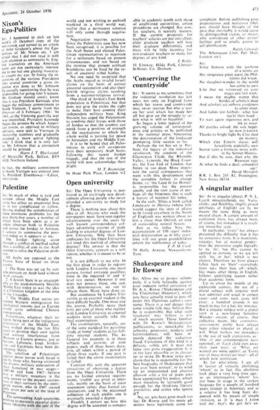Palestine
Sir: So much of what is said and written about the Middle East crisis has either an emotional bias or is too complicated to follow. Having studied the complexities of these enormous problems for the past thirty-five years, a number of which have been spent as a re- sident observer both in Palestine and across the Jordan in Amman, I venture to summarise the posi- tion today as it appears to me. The Jordan fighting arose through a conflict of method rather than a conflict of aim in the Arab attempt to solve the Palestine prob- lem.
All Arabs are opposed to the Zionist State of Israel on three counts:
I The State was set up by out- side pressure on Arab land without Arab consent.
2. A Jewish State is as unaccept- able to the predominantly Muslim Middle East today as was the idea of a Christian kingdom at the time of the Crusades.
3. The Middle East resists un- limited Western immigration for ideological reasons just as Europe would resist unlimited Chinese Immigration.
Palestinians, whatever their re- ligion, being part of the indigenous Population of the Middle East, have wished during the last fifty years to develop their own native Lind without interference from Western or Eastern powers, just as Syrians, Lebanese, Iraqi. Jordan- ians and Egyptians have been de- 'doping theirs. The rebellion of Palestinians against peace moves with Israel is led by those who, having witnessed the Zionist military annexation of their homeland in two stages- 1947-48 and June 1967—believe that a military recapture is the Only answer to the present usurpa- tion of their territory by the immi- grant nation, who in 1947 owned only seven per cent of the land of
Palestine.
,The surrounding Arab countries, 'shine to maintain peaceful diplo- tic relations with the rest of the world and not wishing to embroil mankind in a third world war, realise that a permanent solution will only come through negotia- tion.
Negotiation requires patience. Since the Palestinian case has now been recognised, it is possible for the Arab States and elected Pales- tinian representatives to negotiate for a settlement based on present circumstances, and not based on the premise that present political boundaries can be fixed by the re- sult of ancestral tribal battles.
No one need be surprised that the Arabs regard as invalid Israeli claims on the basis of extinct ancestral occupation and also their Jewish religious claims resulting from a national-religious revival.
One third of Jordan's East Bank Population is Palestinian. but that does not give the exiles the right to make their host country their independent military base. King Hussein has urged the Palestinians to combine their forces with those of Jordan so that the country can speak from a position of strength at the negotiations to which the whole world is turning for peace in Jerusalem and the Middle East.
It is to be hoped that all Pales- tinians in exile will co-operate with their temporary Arab hosts, following this recent Jordan tragedy, and that the rest of the world will now acknowledge their plight.














































 Previous page
Previous page